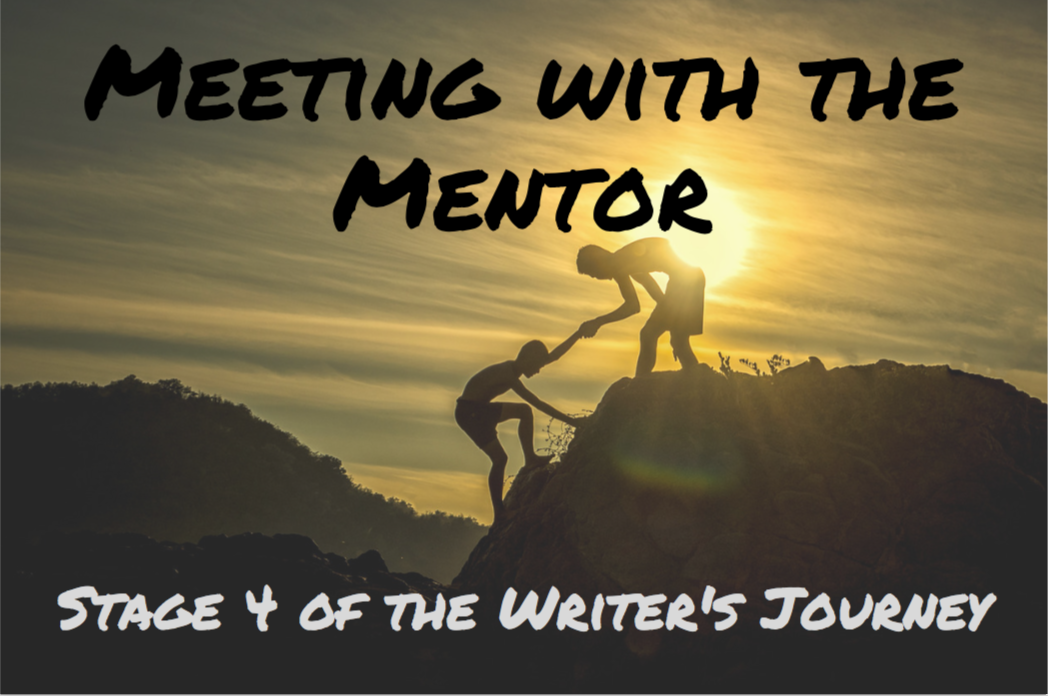Because everyone loves a good story
Stage Four: Meeting with the Mentor

Master and apprentice. Jedi and Padawan. Executive chef and sous chef. Store manager and shelf stocker. As you can see, the world is full of Mentors.
So far in our study of Christopher Vogler’s version of the Hero’s Journey, the hero has received a Call to Adventure and has promptly refused the Call. So how is the story supposed to get rolling again? Enter, the Mentor.
Everyone knows about Mentors because most adventures feature at least one. But why, exactly, is that so? Because Mentors play a vital role in the story: they make sure that “the hero gains the supplies, knowledge, and confidence needed to overcome fear and commence the adventure” (117). Many heroes start out feeling a little unsure and unqualified. It’s a Mentor’s job to make sure the hero overcomes these and other obstacles in order to get the hero out the door.
What Makes a Mentor?
So how do they accomplish this? Often, the Mentor will provide the hero with a physical item that helps throughout the story. It could be a book for wisdom, a weapon for protection, a map for direction, or even just a clue to get them searching. But anyone can go around handing out swords and maps; that doesn’t make them a Mentor. The difference is that Mentors will always impart confidence to the hero, convincing him or her that the quest is possible and necessary. As Vogler says, “Even if physical gifts are given, Mentors also strengthen the hero’s mind to face an ordeal with confidence” (121).
Anyone can go around handing out swords and maps; that doesn’t make them a Mentor.
But although everyone is familiar with the Mentor stereotype, that doesn’t mean that every adventure has to include a wonderful fairy godmother or a shaman-like Yoda. Sometimes the Mentor surprises us by deceiving the hero, making mistakes, refusing to let the hero move on, or turning out to be a bust after all. For example, Oz, the great and powerful wizard, is no more than a blundering, bluffing old man behind a curtain. Not much of a Mentor. However, Glinda the good witch provides “aid, advice, and magical equipment” to get the story “unstuck” (124). Now, that’s a Mentor.
Even Mentors Make Mistakes
In some stories, a Mentor with good intentions gives the best advice he can manage, but it still turns out badly in the end. This type of story is a tragedy. No, really; I mean the genre is that of the tragedy. For example, in Shakespeare’s Romeo and Juliet, Friar Lawrence wisely cautions the impulsive Romeo about his newest romantic interest, Juliet. However, the friar ultimately decides to marry the young couple anyway, hoping it will bring peace between the families. He is also responsible for Juliet’s fake death and, indirectly, for the fact that Romeo never got the memo that the death was, indeed, fake. As you know, the warring families did make peace in the end, but only after half of the characters are dead and bleeding on the stage. Ultimately, the friar was right but certainly not in the way he’d planned. Oh well. Romeo wasn’t much of a hero anyway.
Examples from The Hobbit
In Tolkien’s The Hobbit, Bilbo’s Mentor is obviously Gandalf. After their initial meeting in which Bilbo refuses the Call to Adventure, Gandalf continues to mentor him, pushing him away from his familiar way of life and talking about him as though he were a qualified burglar. However, Bilbo remains uncommitted to the Adventure until it’s almost too late. The dwarves have left long before Bilbo wakes up that morning, and he begins to think he’s off the hook. If he’d been more familiar with Gandalf, no doubt he would have known better. Sure enough, just as Bilbo is sitting down to his second breakfast, the wizard arrives, blustering on about the message that the dwarves had left—a message that Bilbo had overlooked. It politely thanks him for his hospitality and expects him to meet them at 11:00—punctually.
“’That leaves you just ten minutes. You will have to run,’ said Gandalf.
“’But—,’ said Bilbo.
“’No time for that either! Off you go!’
“To the end of his days Bilbo could never remember how he found himself outside, without a hat, a walking-stick or any money…running as fast as his furry feet could carry him down the lane” (29-30).
After that final Meeting with the Mentor, Bilbo was off to accomplish the next stage of the Hero’s Journey: Crossing the First Threshold.
Today’s Question: Think of a character who fulfills the role of Mentor. How does he or she provide the “supplies, knowledge, [or] confidence” that the hero needs?
Sources:
Vogler, Christopher. The Writer’s Journey: Mythic Structure for Writers, Second Edition. Studio City: Michael Wiese Productions, 1998.
Tolkien, J.R.R. The Hobbit. New York: Ballantine Books, 1937.




I liked the trainer/mentor in the Mask of Zorro. Anthony Hopkins does an excellent job of training the next Zorro. He is the hard core type of trainer that doesn’t let up or make it easy on him. He also tries to direct Zorro not to take revenge. So he doesn’t just work on the physical aspect of training but the mental part too. Guiding a character’s morral compass in the right direction is key in helping them become a true hero and not an antihero or villain.
I love that movie! You’re right–the mentor has a lot to do with the hero’s moral fiber. Great example!